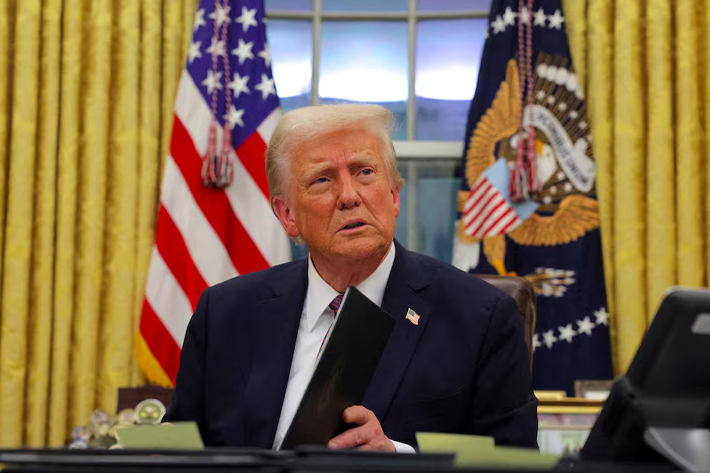US President Donald Trump said early on Friday (US time) that China had violated the agreement it reached on tariffs with US officials in Geneva several weeks ago.
“China, perhaps not surprisingly to some, HAS TOTALLY VIOLATED ITS AGREEMENT WITH US. So much for being Mr NICE GUY!,” Trump said in a post on his Truth Social platform.
Trump did not specify what China had done – or failed to do, but US Treasury Secretary Scott Bessent told Fox News on Thursday that trade talks with China were “a bit stalled” and said getting a deal over the finish line would likely need the direct involvement of President Trump and Chinese President Xi Jinping.
ALSO SEE: Trump’s Tariffs Reinstated as Appeals Court Pauses Trade Ruling
Two and a half weeks after breakthrough negotiations that resulted in a temporary truce in the trade war between the world’s two biggest economies, Bessent said progress since then has been slow, but remarked that he expects more talks in the next few weeks.
The US-China agreement to dial back triple-digit tariffs for 90 days prompted a massive relief rally in global stocks.
But it did nothing to address the underlying reasons for Trump’s tariffs on Chinese goods, mainly longstanding US complaints about China’s state-dominated, export-driven economic model, leaving those issues for future talks.

Signs of discontent
But US actions over the past week or more have suggested the White House was unhappy with several matters, such as the trade court’s decision on Wednesday to block some of the president’s tariffs – a decision overturned by an appeal court on Thursday – and how things have played out in regard to the May 12 trade deal with Beijing.
The Commerce Department said it was reviewing exports of strategic significance to China, while noting “in some cases, Commerce has suspended existing export licences or imposed additional licence requirements while the review is pending.”
The Trump Administration ordered companies to stop shipping certain products to China – such as goods related to computer chips – without a licence, and revoked licences already granted to some suppliers.
The restrictions appeared aimed at choke points to prevent China from getting products necessary for key sectors, one sources told Reuters. Products affected include design software and chemicals for semiconductors, butane and ethane, machine tools, and aviation equipment, the people said.
Many companies received letters from the Department of Commerce in recent days informing them of the new restrictions, Reuters reported on Thursday. Firms that supply electronic design automation (EDA) software for semiconductors were sent letters last Friday that licences would now be needed to ship to Chinese customers, two of the sources said.
The electronic design automation software makers included Cadence, Synopsys and Siemens EDA. The Department would review requests for licences to ship to China on a case-by-case basis, suggesting the action was not an outright ban.
Washington also began to revoke visas for Chinese students wanting to study at top universities in the US, such as Harvard.
CNN has said there were more than 270,000 Chinese students in the US in 2024 and that some come from the country’s political and business elites.
China’s foreign ministry said on Thursday it strongly opposed the “unjust” revoking of visas “under the pretext of ideology and national security.”
Sluggish response on rare earth exports
The broad swathe of these moves got analysts wondering if they may be linked to the countries’ trade dispute.
There has been uncertainty on whether Beijing had adhered to its agreement in Switzerland to restore exports of rare earth elements, or may have wanted to drag its feet on restoring controls it imposed because of the upheaval the tariff crisis caused exporters in China, given reports of mass layoffs.
Beijing said on Friday it would cooperate further with other countries over its rare earth export controls as shortages put auto and semiconductor makers in Europe and India at risk of closure.
China, which controls over 90% of global processing capacity for the rare earth magnets used in everything from cars to fighter jets and home appliances, imposed restrictions in early April requiring exporters to obtain licences from Beijing.
While a handful of licences were granted, including to some Volkswagen suppliers, Indian automakers said they had received none and would have to stop production in early June, Reuters reported on Friday.
“We stand ready to strengthen dialogue and cooperation in the field of export control with relevant countries and regions and stay committed to maintaining the stability of global production and supply chains,” foreign ministry spokesperson Lin Jian said on Friday when asked about the controls.
Chinese state media reported on Wednesday that the country could relax its curbs on rare-earth exports for Chinese and European semiconductor firms after meetings between industry and the Ministry of Commerce where the issue of shortages was raised.
Meanwhile, The New York Times reported earlier this week that the US suspension of sales of critical technologies to China included parts for state-owned plane maker COMAC, in response to China’s restriction on exports of critical minerals.
Are there other issues? Maybe we’ll find out in coming days.
ALSO SEE:
Shipments of US Ethane to China Face Export Licence Uncertainty
US Blocks Chip Design Software, Chemical Shipments to China
Trump’s Tariffs Reinstated as Appeals Court Pauses Trade Ruling
Nvidia ‘Plans Low-Cost Blackwell AI Chip For China’ After US Curbs
Beijing Says Latest US Chip Warning Puts Trade Truce at Risk
Mass Layoffs Avoided in China, But Export Sector Badly Shaken
Asian Markets Rise After US, China Agree to Cut Majority of Tariffs
China Lifts Tariff on US Goods to 125%, as ‘Hikes Become a Joke’
Tariffs on Imported Chips to be Announced Soon, Trump Says
Asian Economies Rocked by Trump’s Tariffs, Fears of Trade War
Carmakers Shares Tumble After Trump Announces 25% Auto Tariff
Xi Calls on Foreign CEOs to Help Protect Supply Chains

